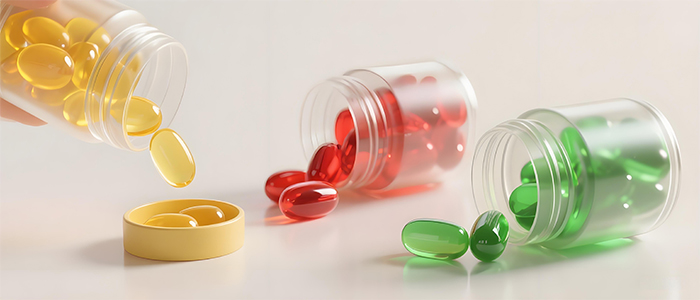
Soft capsules, also called soft gel capsules, are flexible, hermetically sealed dosage forms widely used in pharmaceuticals, nutraceuticals, and cosmetics to encapsulate liquid, semi-solid, or paste-like substances.
Constructed from a gelatin-glycerin-water blend, their elastic shell adapts to varying viscosities, distinguishing them from rigid two-piece hard capsules. This design ensures airtight containment, protecting sensitive ingredients like oils and suspensions from external contaminants while enabling consistent dissolution in the digestive tract.
• Ideal for oil-based medications (e.g., omega-3s, fat-soluble vitamins A/D/E/K) that require protection from oxidation or moisture.
• Enhance bioavailability through uniform shell dissolution, supporting controlled-release formulations for improved therapeutic effects.
• Dominate dietary supplements such as fish oil, evening primrose oil, and coenzyme Q10, preserving liquid actives without degradation.
• Preferred for pediatric/geriatric use due to their smooth texture, reducing swallowing difficulties.
Gaining traction in topical applications such as single-use capsules for serums (facial oils, serums), ensuring hygienic, precise dosing of concentrated active ingredients.

|
Feature |
Soft Capsules |
Normal (Hard) Capsules |
|
Structure |
Single-piece elastic shell (hermetically sealed) |
Two-piece design (cap + body, non-sealed) |
|
Fill Material |
Liquids, semi-solids, suspensions |
Powders, granules, small pellets |
|
Sealability |
Prevents leakage/contamination |
Higher risk of moisture/air exposure at joints |
|
Bioavailability |
Faster, more uniform dissolution |
Dependent on fill material and shell integrity |
|
Production |
Specialized rotary die/seamless encapsulation |
Simpler filling of pre-formed shells |
|
Cost |
Higher (complex manufacturing, material needs) |
Lower (standard formulations, simpler process) |
Soft capsules offer a versatile solution for encapsulating liquid and semi-solid substances, combining protective hermetic sealing with enhanced bioavailability. Their applications span pharmaceuticals, supplements, and cosmetics, particularly excelling in oil-based formulations where ingredient stability and controlled release are critical. While normal capsules provide cost-effective simplicity for solid fills, soft capsules stand out for their adaptability to sensitive or viscous materials through specialized manufacturing techniques. Manufacturers should prioritize content physical state, stability requirements, and target dissolution profiles when choosing between the two, ensuring optimal product performance and user experience with considerations with considerations for equipment like capsule filling machines where relevant.

GET A QUOTE